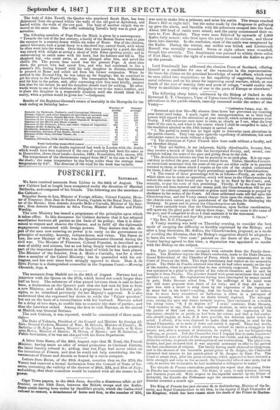Lord Dundonald has addressed the elective Peers of Scotland, offering
himself as a candidate for one of the vacancies is the representation. He bases his claims on his practical knowledge of naval affairs, which may be soon called into requisition; on his capability of suggesting important naval reforms; and on his plans for improving naval warfare, which, at one fourth of the cost of making forts and ports of refuge, " would enable the Navy to annihilate every ship of war in the ports of Europe or elsewhere."
The following sharp letter, addressed by the Bishop of Oxford to the Reverend E. T. Champnes, Vicar of Upton-cum-Chalvey, relates to certain alterations in the parish-church, recently executed under the orders of the Vestry-
" Cuddesdon Palace, Aug. 23. " Reverend and dear Sir—My absence from home has prevented my receiving your letter until today. I much regret the misapprehension, as to their legal powers with regard to the alterations at your church, which seems to possess your Vestry. I will endeavour once more to state, as clearly as I can, what the true state of the case is, and what is the course which I shall be compelled to take, if the resolution adopted on the 19th instant is carried out- " 1. The parish in vestry has no legal right to determine upon alterations in the parish-church. They may agree upon the expediency of alterations, but such alterations cannot be made without a faculty. " 2. The alterations at Upton Church have been made without a faculty, and are therefore illegal. " S. They are further, in my judgment, highly objectionable, because, first, they involve a breach of faith with the Incorporated Society, and, second, con- template taking the seats of the poor and giving them to the rich. " The Archdeacon informs me that he assented to no such plan. It is my espe- cial duty to defend the poor, and I must defend them. Unless, therefore I receive an immediate assurance that the seats of the poor are either really or in practice restored to them, or those which I require at the side of the church substituted for them, I shall be compelled to begin proceedings against the Churchwardens. "4. The course of these proceedings will be as follows—Firstly, an order (to which there can be made no opposition, even) will issue to the Churchwardens to restore the seats to their former state by a day to be fixed by the Court; and, secondly, to pay the costa of this proceeding. Thirdly, if by the day fixed the seats have not been restored and the money paid, the Churchwardens will be pro- nounced ' in contempt,' and committed to prison until their contempt is purged by obedience to the orders of the Court. All these additional costs will fall upon the Churchwardens, and the Vestry cannot charge them upon the church-rates; for the church-rates cannot pay the punishment of the Wardens for disobeying the Ordinary. In purse and in person the Churchwardens are liable. " I most earnestly trust that the Churchwarden, upon further consideration, will spare me the great pain of taking these steps; but the cause is the cause of the poor, and if compelled to do so I shall maintain it to the uttermost. "I sin, reverend and dear Sir, yours very truly, S. Oxott." " The Rev. E. C. Champnes."
A Vestry meeting was held on Thursday evening, to consider the best mode of escaping the difficulty so forcibly explained by the Bishop; and after a long discussion, Mr. Atkins, the Churchwarden, proposed, as a mode of avoiding the dilemma, that the Bishop's suggestion should be adopted— to have the words "free seats" painted on the doors of the pews. The Vestry having agreed to this view, a deputation was appointed to confer with the Bishop on the subject.


























 Previous page
Previous page